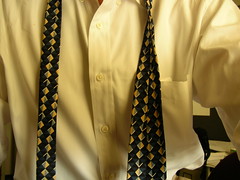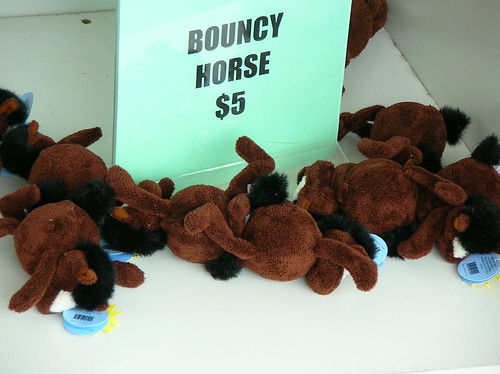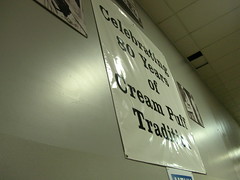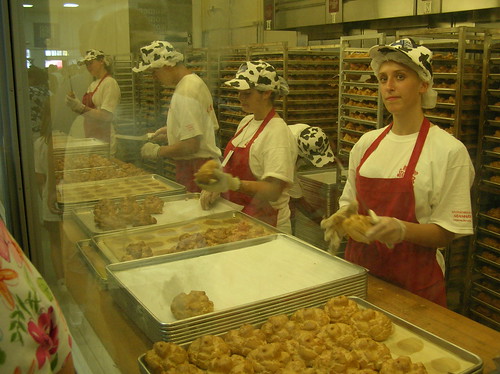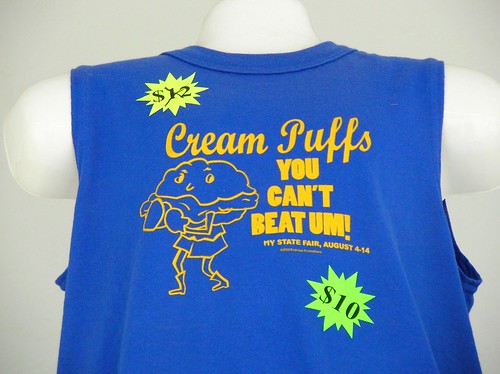Wednesday, August 31, 2005
Taking a good joke too far
I found that whole "we're getting married" thing between fellow bloggers Tonya and Jeremy to be a bit irritating. Either it was a joke, in which case it really wasn't that funny; or it was true, in which case, it was kind of weird the way they were announcing it. But it obviously wasn't true. Or so I thought... until I saw this banner ad on my Sitemeter page:
Tuesday, August 30, 2005
This season's new look
In my fashion statement of last winter, I pioneered the loose belt look:
I call it "oh, f*ck, there's the freakin' bus!" or simply, "Bus tie!"
The front half of my belt (the end with the holes) protruded from under my waist-length jacket, hanging down my backside like a large rat tail, in full view of anyone behind me.This fall, I'm going with a little accessorizing technique that showcases the undone tie hanging loosely around the neck.
Perfect for the "business casual" look.
I call it "oh, f*ck, there's the freakin' bus!" or simply, "Bus tie!"
Monday, August 29, 2005
Who's the ass here?
Where do I start with Adam Liptak's kinda stupid NYT story yesterday, entitled "If the Law Is an Ass, the Law Professor Is a Donkey"? (Doff of cap to Althouse.)
Liptak reports on a forthcoming Georgetown Law Journal "study" that
And let's put these numbers in context. Assume an average of 45-50 law professors on a law faculty (that number is probably high), we're talking about fewer than 1,000 law professors in the study. About 270 of these professors supposedly gave money to democrats, and about 50 gave money to Republicans. It is certainly conceivable that among the 650 "non-activists" on these faculties, there could be more Republicans than Democrats. The study doesn't sample them, of course, but if there were 400 Republicans among the non-activists, then you would get a very unremarkable 50-45 Democrat-Republican split, and you could just throw out the entire Georgetown study. If there is any doubt that these numbers can be extremely misleading, look no further than the fact that one of the most conservative faculties among the top 20 law schools, Chicago, came across as "liberal" in this study and "more liberal than Berkeley."
Really, the "study" is just a veneer of academic methodology to justify a publication revealing the shocking fact that law professors as a group are more liberal than Americans as a whole. Let's just forget the bogus sociology and just assume lawprofs are more liberal than your average bear -- as are university professors are said to be generally. So what? What's the game here?
Certainly, it is part of a broad conservative strategy to exaggerate how liberal the legal system is -- look at the far right's attack on the "liberal, activist judiciary" we supposedly have now -- and exaggerating the liberality of law schools fits neatly into this strategy.
The article apparently has a related axe to grind: academic, as opposed to judicial, appointments. The Georgetown study argues that while law schools pursue affirmative action plans to "promote diversity in the classroom," they discourage diversity in faculty hiring by creating a liberal orthodoxy among faculty. Aha.
The truth is that law schools pursue affirmative action plans primarily to compensate for historical and ongoing vestiges of race discrimination. Diversity of viewpoints is just a side benefit of racial diversity, but schools have to pretend they are primarily seeking viewpoint diversity only because the Supreme Court has said that redressing historical and societal discrimination is not a valid justification for affirmative action, while viewpoint diversity is. (Thanks, Justice O'Connor.) The Georgetown article is trying to play a manipulative game of "gotcha" with a glitch in the law created largely by conservative justices.
But let's take the argument through to it's conclusion. Again, so what? The Georgetown study author is talking about faculty hiring, not student admissions: but to suggest that qualified conservative applicants for law professor jobs are facing rampant discrimination from liberal professors based only on the fact that more professors are liberal than conservative is faulty inferential reasoning. Law professor applicants are a self-selected group, and you can't simply assume that conservatives seek academic jobs in proportion to their numbers among JDs.
Is the author of the Georgetown study proposing affirmative action for conservative applicants for law teaching? Talk about inconsistency -- (no affirmative action based on race, but yes based on conservative political views) -- and a terrible idea. While there is a tendency for academic departments to replicate their own orthodoxies in hiring, the implied affirmative action proposal in the Georgetown study would require hiring committees to make intrusive inquiries into the political views of job applicants -- something that doesn't happen now in law school hiring and that seems quite perverse if the goal is to promote diversity of political views.
So why exactly should measures be taken to "correct" the "liberal bias" of law schools?
Is it to protect students from "liberal indoctrination"? Anyone who thinks that law professors are able to "indoctrinate" their students should, well, talk to a few law students. Attempts at liberal indoctrination are met with cold stares and invective-filled course evaluations. Law students are just not looking to have their minds molded like impressionable clay. As Posner nicely put it in the Liptak article, students view law school as "career preparation, not Sunday chapel."
Is it because conservative ideas are simply shouted down or crowded out by the overwhelming liberal orthodoxy of our public discourse? Hmm, maybe that's it.
There's a certain strand of conservative whining within law schools that I've heard for years, since my own law school days. "We control all three branches of the federal government, but, boo hoo, we don't control the law schools and we feel so ... so alienated here." Some social scientist should do a study of why conservatives feel it grounds for complaint unless they control every institution in society.
The Georgetown study should be nominated for some type of award for in-depth analysis of a big societal not-a-problem. And Liptak should win a journalism award for breaking the story that law professors are more liberal than other Americans as a whole -- an anecdotal impression that may or may not be accurate.
Liptak reports on a forthcoming Georgetown Law Journal "study" that
analyzes 11 years of records reflecting federal campaign contributions by professors at the top 21 law schools as ranked by U.S. News & World Report. Almost a third of these law professors contribute to campaigns, but of them, the study finds, 81 percent who contributed $200 or more gave wholly or mostly to Democrats; 15 percent gave wholly or mostly to Republicans.Whoa, there fella. The study wants us to assume that these 1/3 of professors who give money are a representative sample of the views of all law professors: 80% democrats, 15 % republicans, and 5% "other." (New flash: Law profs are more likely to hold nutty fringe views than Americans in general!) But there are all sorts of reasons to assume that this sample is skewed. Sample hypotheses: What if donors at this income level are more likely to be activists, who may be more likely than an average sample of American voters to be liberal (or fringe)? And what if Democratic fundraisers direct a higher proportion of their appeals to middle class intellectuals, while Republic grass roots fundraisers tend to ignore lawprof types and hit the evangelical Christians? Bad, baaad social science.
And let's put these numbers in context. Assume an average of 45-50 law professors on a law faculty (that number is probably high), we're talking about fewer than 1,000 law professors in the study. About 270 of these professors supposedly gave money to democrats, and about 50 gave money to Republicans. It is certainly conceivable that among the 650 "non-activists" on these faculties, there could be more Republicans than Democrats. The study doesn't sample them, of course, but if there were 400 Republicans among the non-activists, then you would get a very unremarkable 50-45 Democrat-Republican split, and you could just throw out the entire Georgetown study. If there is any doubt that these numbers can be extremely misleading, look no further than the fact that one of the most conservative faculties among the top 20 law schools, Chicago, came across as "liberal" in this study and "more liberal than Berkeley."
Really, the "study" is just a veneer of academic methodology to justify a publication revealing the shocking fact that law professors as a group are more liberal than Americans as a whole. Let's just forget the bogus sociology and just assume lawprofs are more liberal than your average bear -- as are university professors are said to be generally. So what? What's the game here?
Certainly, it is part of a broad conservative strategy to exaggerate how liberal the legal system is -- look at the far right's attack on the "liberal, activist judiciary" we supposedly have now -- and exaggerating the liberality of law schools fits neatly into this strategy.
The article apparently has a related axe to grind: academic, as opposed to judicial, appointments. The Georgetown study argues that while law schools pursue affirmative action plans to "promote diversity in the classroom," they discourage diversity in faculty hiring by creating a liberal orthodoxy among faculty. Aha.
The truth is that law schools pursue affirmative action plans primarily to compensate for historical and ongoing vestiges of race discrimination. Diversity of viewpoints is just a side benefit of racial diversity, but schools have to pretend they are primarily seeking viewpoint diversity only because the Supreme Court has said that redressing historical and societal discrimination is not a valid justification for affirmative action, while viewpoint diversity is. (Thanks, Justice O'Connor.) The Georgetown article is trying to play a manipulative game of "gotcha" with a glitch in the law created largely by conservative justices.
But let's take the argument through to it's conclusion. Again, so what? The Georgetown study author is talking about faculty hiring, not student admissions: but to suggest that qualified conservative applicants for law professor jobs are facing rampant discrimination from liberal professors based only on the fact that more professors are liberal than conservative is faulty inferential reasoning. Law professor applicants are a self-selected group, and you can't simply assume that conservatives seek academic jobs in proportion to their numbers among JDs.
Is the author of the Georgetown study proposing affirmative action for conservative applicants for law teaching? Talk about inconsistency -- (no affirmative action based on race, but yes based on conservative political views) -- and a terrible idea. While there is a tendency for academic departments to replicate their own orthodoxies in hiring, the implied affirmative action proposal in the Georgetown study would require hiring committees to make intrusive inquiries into the political views of job applicants -- something that doesn't happen now in law school hiring and that seems quite perverse if the goal is to promote diversity of political views.
So why exactly should measures be taken to "correct" the "liberal bias" of law schools?
Is it to protect students from "liberal indoctrination"? Anyone who thinks that law professors are able to "indoctrinate" their students should, well, talk to a few law students. Attempts at liberal indoctrination are met with cold stares and invective-filled course evaluations. Law students are just not looking to have their minds molded like impressionable clay. As Posner nicely put it in the Liptak article, students view law school as "career preparation, not Sunday chapel."
Is it because conservative ideas are simply shouted down or crowded out by the overwhelming liberal orthodoxy of our public discourse? Hmm, maybe that's it.
There's a certain strand of conservative whining within law schools that I've heard for years, since my own law school days. "We control all three branches of the federal government, but, boo hoo, we don't control the law schools and we feel so ... so alienated here." Some social scientist should do a study of why conservatives feel it grounds for complaint unless they control every institution in society.
The Georgetown study should be nominated for some type of award for in-depth analysis of a big societal not-a-problem. And Liptak should win a journalism award for breaking the story that law professors are more liberal than other Americans as a whole -- an anecdotal impression that may or may not be accurate.
Sunday, August 28, 2005
A convergence of silly themes too good to pass up
My blog is the number 3 search result for the Google search "missy watertown" due, of course, to this post about Yahoo Personals' "Missy" of Watertown, NY. The first hit is Yahoo's Personals page itself.
The second search result is to a somewhat crude discussion thread, featuring a guy who says he "planning to have a one night stand" with Missy because he is "within 50 miles of Watertown."
By the way, I continue to get about 10-15 hits per day from my original post about Missy -- no doubt guys who "plan" to hook up with her by searching on Google.
The irresistable thematic convergence? It's this post from Fool Blog: "Hasn't Missy of Watertown, NY gotten a freakin' date yet?" See here young man.
The second search result is to a somewhat crude discussion thread, featuring a guy who says he "planning to have a one night stand" with Missy because he is "within 50 miles of Watertown."
By the way, I continue to get about 10-15 hits per day from my original post about Missy -- no doubt guys who "plan" to hook up with her by searching on Google.
The irresistable thematic convergence? It's this post from Fool Blog: "Hasn't Missy of Watertown, NY gotten a freakin' date yet?" See here young man.
The Paradox of the Evil Meme
Blogging about the Google searches that lead people to one's own blog has become quite the meme. See here, here, here, here, here, here, here, here and -- the earliest-dated post I know of that did this, and thus the presumptive creator of the meme -- here. (Though that honor probably belongs here.)
(This is not to be confused with the related but different meme of checking one's own google ranking for certain searches: e.g., here and here.)
What I refer to as the "Evil Meme" is when a blogger finds that a particularly irksome Google search leads to her blog. I've noticed a couple of blogs pointing out how their blogs came up in searches for porn sites. (See, e.g., here.)
At one point, I was the number four hit for "big butt tv," a phrase I used to describe my 1988 Mitsubishi TV with its huge cathode-ray tube protruding out the backside in comparison to a sleek new flatscreen. Fortunately, I'm no longer anywhere near the top of that search, thanks no doubt to the advent of a porn site by the same name.
The paradox here is that by blogging about unwanted Google search referral traffic, we bloggers inevitably repeat the phrase that created the search right in the complaining post. Which will of course produce more Google hits for that search. As Moral Turpitude once put it:
... welcome Google-referred porn-heads!
(This is not to be confused with the related but different meme of checking one's own google ranking for certain searches: e.g., here and here.)
What I refer to as the "Evil Meme" is when a blogger finds that a particularly irksome Google search leads to her blog. I've noticed a couple of blogs pointing out how their blogs came up in searches for porn sites. (See, e.g., here.)
At one point, I was the number four hit for "big butt tv," a phrase I used to describe my 1988 Mitsubishi TV with its huge cathode-ray tube protruding out the backside in comparison to a sleek new flatscreen. Fortunately, I'm no longer anywhere near the top of that search, thanks no doubt to the advent of a porn site by the same name.
The paradox here is that by blogging about unwanted Google search referral traffic, we bloggers inevitably repeat the phrase that created the search right in the complaining post. Which will of course produce more Google hits for that search. As Moral Turpitude once put it:
I probably shouldn't use the word "porn" in my blog. I'll end up with random perverts cruising in from google searches. YOU perverts are perfectly random enough for me already.By the way, when in my post yesterday I refered to F*ck as a TAT, I should have added that it's also a GAT (Google Avoidance Technique). One of my commenters used the full, spelled out word several times in the comments, so....
... welcome Google-referred porn-heads!
The Grocery Bag
When I was five, my friend Jamie forbade me to play with one of his toys because there was "a special way" to use it. I don't remember the toy, but I remember the denial and the phrase "there's a special way." It turns out to be a recurring theme in life: the tone of condescension mixed with exasperation, leading to "I'll just do it myself."
This turns out to be an occupational hazard of the grocery bagger, as I've learned in my Saturday grocery bagging job at the Neighborhood Food Co-op.
I understand that many people want their groceries bagged in a "special way." It's inconvenient to have a bag packed too heavily, and nobody wants their fruit bruised and crushed because it's been packed underneath the canned goods.
Nor does it bother me that about 50-60% of the shoppers at the co-op prefer to bag their own groceries. Many people find occasional grocery-bagging to be fun. I do -- that's why I volunteer for the three hour Saturday grocery bagging shift.
But here's what annoys me. I ask everyone "would you like help bagging your groceries," or "would you like me to bag those for you?" And here's just some of the broad range of responses I get:
Then there's a surprisingly high percentage of people who treat the question "would you like me to bag your groceries?" as though I were the Keeper of the Bridge of Death in Monty Python and the Holy Grail:
It turns out, when it comes to replying to "would you like me to bag your groceries?" in the negative, there's a special way: it's "No, thanks."
Facts of the Day, Saturday, August 27:
Best celebrity sighting: Wayne, the mailman.
Best line by co-op employee: This dialogue between the two women working at the juice bar, explaining why they felt a popular neighborhood bar-restaurant was "pretentious."
This turns out to be an occupational hazard of the grocery bagger, as I've learned in my Saturday grocery bagging job at the Neighborhood Food Co-op.
I understand that many people want their groceries bagged in a "special way." It's inconvenient to have a bag packed too heavily, and nobody wants their fruit bruised and crushed because it's been packed underneath the canned goods.
Nor does it bother me that about 50-60% of the shoppers at the co-op prefer to bag their own groceries. Many people find occasional grocery-bagging to be fun. I do -- that's why I volunteer for the three hour Saturday grocery bagging shift.
But here's what annoys me. I ask everyone "would you like help bagging your groceries," or "would you like me to bag those for you?" And here's just some of the broad range of responses I get:
- (Insulted tone) "I think I can handle it myself." I wasn't suggesting you're incapable.
- (Shocked or suspicious tone) "I can do it." I wasn't trying to steal your stuff.
- A grimly determined stare with no verbal response at all, as the customer starts bagging own groceries.
- "I have my own bags." Non-responsive: many people want me to bag their groceries in their reusable canvas tote bags.
- "I have a special way." Whatever!
- "Um, I don't know. I guess you can... if you want to." Well, do YOU want to? Or do you want ME to?
- "Umm... ummm ... umm... I think I can handle it myself." What is the capital of Assyria?
- "Umm... okay. Well, no, actually, I'd rather do it myslef." What is your favorite color? Blue--. NO-- yellow!
It turns out, when it comes to replying to "would you like me to bag your groceries?" in the negative, there's a special way: it's "No, thanks."
Facts of the Day, Saturday, August 27:
Best celebrity sighting: Wayne, the mailman.
Best line by co-op employee: This dialogue between the two women working at the juice bar, explaining why they felt a popular neighborhood bar-restaurant was "pretentious."
Barista #1: "They're just so in your face with their sexuality."
Barista #2: "Yeah, they blatantly flirt with you, and it's just because they're blatantly trying for bigger tips."
Saturday, August 27, 2005
Freakin' TATs
It seems like there has been a renaissance of the word "freakin'" as a "taboo avoidance" word for "f*cking." (Okay, so the * is my own taboo avoidance.) For example, here, here, here, and here. The word is particularly popular over at The Tonya Show: if you run this Google search in the search window of her blog, you get 22 separate posts that use "freakin'."
I like "freakin'." (I mean the use of the word. Well, the other thing too.) It's so cute and quaint, like the kind of cuss words that you'd find in West Side Story, which has the most boy-scoutish portrayal of street gangs ever to hit stage or screen. "Gee, Officer Krupke -- Krup you!"
Speaking of taboo avoidance. Let's turn to the Journal of Anthropological Research, and scroll down to the article entitled "Menstruation as a Verbal Taboo among the Akan of Ghana," which explains:
Let's look at some other fun taboo avoidance words (TAWs). For F*ck: freak, frig, frick, fug, f---, boink, bonk, pork, and in many song lyrics, rock. For Jesus Christ: Jeez, sheezus, cheezus, cripes, crikey and Jiminy Cricket. For damn: darn, dang, durn, and if you want to throw God in: goll, gollie, gosh, not to mention gollie gee and gollie jeez. And also dad burn and dad gum for god damn. For sh*t: shoot.
Gosh darn, I'm all out of TAWs. Do you have any?
I like "freakin'." (I mean the use of the word. Well, the other thing too.) It's so cute and quaint, like the kind of cuss words that you'd find in West Side Story, which has the most boy-scoutish portrayal of street gangs ever to hit stage or screen. "Gee, Officer Krupke -- Krup you!"
Speaking of taboo avoidance. Let's turn to the Journal of Anthropological Research, and scroll down to the article entitled "Menstruation as a Verbal Taboo among the Akan of Ghana," which explains:
The use of euphemisms is the most popular verbal Taboo Avoidance Technique (TAT) among the Akan.Well, euphemisms are a popular TAT everywhere. According to The Free Dictionary.com,
The euphemistic expression breathe one's last illustrates a widespread linguistic and cultural phenomenon known as taboo avoidance.Of course, "freakin' " is not a euphemism, which is substituting a word or phrase that has acquired the same meaning but has an entirely different derivation. Euphemisms for "f*ck" are words and phases like "screw," "play hide the salami," "bury the bone" or "make the beast with two backs." Freakin' is something else ("freakin' is somethin' else, man"), involving substituting sound alike words or sound-alike non-words, and if I'm not mistaken, one of my linguistics friends will soon send a comment or email with the correct name for the freakin' form of TAT.
Gosh darn, I'm all out of TAWs. Do you have any?
Friday, August 26, 2005
Are the Mets just toying with me?
It's almost September, and to my astonishment, the Mets have quietly slipped into contention for a post-season berth. Well, maybe not quiet if you listen to New York area sports talk radio, which I don't. At 67-60, they're only 1.5 games behind the wild-card frontrunning Phillies and even have a shot at catching the braves, who lead by only 5 games.
The question is whether the Mets recent 8-2 run (including an impressive 4 game sweep in Arizona) represents a transformation of the team from the archetypal win-three, lose-three .500 team they've been all year into a .600 team (i.e., that can win at least 21 of its next 35 games). The lack of a such transformation is why teams that have kept close, like the Cubs or even the Brewers, are really out of the race.
The Mets may be transformed because (1) they have a couple of rookies and near rookies who are starting to realize their upside potential (David Wright, Victor Diaz); (2) a surprise impact rookie (Mike Jacobs) who may be the real thing; and (3) the return of Steve Trachsel to solidify a pitching rotation with surprising top-to-bottom quality. There are dozens of reasons why the Mets should fail, but their hope of winning the wild card doesn't rest on the typical vain wish that underacheivers will start playing better.
If you follow the Mets at all, please join me in saying "what's up with that weirdly idiotic internet poll on your official web site?"
If they stick with a five man rotation, don't you have to at least consider that the "spot starter" should be the erratic 8-10 Victor Zambrano?
The question is whether the Mets recent 8-2 run (including an impressive 4 game sweep in Arizona) represents a transformation of the team from the archetypal win-three, lose-three .500 team they've been all year into a .600 team (i.e., that can win at least 21 of its next 35 games). The lack of a such transformation is why teams that have kept close, like the Cubs or even the Brewers, are really out of the race.
The Mets may be transformed because (1) they have a couple of rookies and near rookies who are starting to realize their upside potential (David Wright, Victor Diaz); (2) a surprise impact rookie (Mike Jacobs) who may be the real thing; and (3) the return of Steve Trachsel to solidify a pitching rotation with surprising top-to-bottom quality. There are dozens of reasons why the Mets should fail, but their hope of winning the wild card doesn't rest on the typical vain wish that underacheivers will start playing better.
If you follow the Mets at all, please join me in saying "what's up with that weirdly idiotic internet poll on your official web site?"
| If the Mets revise their rotation to include Steve Trachsel, how should they do it? Use six starters Use Jae Seo to spot start Use Trachsel to spot start |
What in the world happened to your finger?
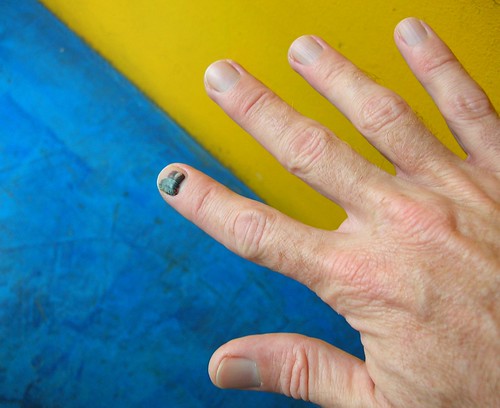
How many of you have spent long moments staring (perhaps in a mirror) at your own physical imperfections, gradually coming to the conclusion: "Well, it's not that noticeable?"
Well, I'm sorry to have to tell you, it is that noticeable. It's probably the first thing people notice about you, and it's the first impression of what you look like, and it will be the most lasting impression of what you look like unless the observer gets to know you well enough to appreciate your inner beauty.
Accept it, get over it, and move on.
The title of this post is a question that I've been getting asked a lot lately. It's my most salient physical imperfection right now, edging out my growing bald patch and my large nose.
The merest acquaintances, nay, total strangers, feel entitled to ask me this question. The lady at the chicken rotisserie counter asked me this yesterday on my very first visit to her shop.
I'd like to think, it's just a fingernail -- people don't really notice it. I'm going to start teaching classes in a few days. Hey, my students won't notice -- will they? And what about all those sometime goths and punks who have partially blackened fingernails from the yucky black nail polish they applied last week? Why do I stand out?
But of course everyone notices. To the lady in the rotisserie place, her answer to "who ordered the sweet potato fries" is not even "the balding guy with the big nose" -- it's "that guy with the black fingernail"!
And what makes everyone think they can just ask? It's not concern -- obviously, I'm functional and not in need of assistance. Is it some sort of token of empathy that makes people think I'd feel better by being forced to revisit, time and time again, that excruciatingly painful incident? No, they just ask to satisfy their own grossed out idle curiosity.
So let me tell everybody once and for all: It's dried encrusted blood bulging under the fingernail. Okay? Are you satisfied? It will be there for weeks or months until the nail grows out! And if you're wondering how I got it, you obviously don't read my blog!
Where am I?
I'm not a joiner
(...or a carpenter.)
The phrase "not a joiner" is supposed to refer to an instinctive resistance to fads. I guess that's part of my self image. That makes it difficult for me to participate in memes. For example, you'll never see the phrase "Friday Random 10" on this blog.
Ooops... damn!
The phrase "not a joiner" is supposed to refer to an instinctive resistance to fads. I guess that's part of my self image. That makes it difficult for me to participate in memes. For example, you'll never see the phrase "Friday Random 10" on this blog.
Ooops... damn!
Existential Friday Grab Bag
Today, a miscellany of posts about existence. Or not.
Thursday, August 25, 2005
Coin of the realm
I like the euro. €.

When they first converted to the uniform European Union currency, I was kind of sad that European travel would lost the charm of different currencies. I used to enjoy looking at the different colors, sizes, words and images on the various currencies of a multi-country European trip.
Boy, have I gotten over that. The hassle of currency exchange windows, doing all kinds of multiplication and division in your head to figure out how much you’re paying, losing money every time you changed currency – don’t miss it at all. If you’re into different looks of currency, you can find different words and images on the Euro depending on which country minted it, but I find I don’t really bother any more. The old currency differences now strike me as about as much fun as getting your passport checked (another formality that is gradually passing from the intra-European scene).
I like that the euro is worth something somewhat close to the dollar. But perhaps most of all, I like its denominations. As you probably know, the smallest unit of euro paper money is the €5 bill. They have small change in 1,2,5,10, 20 and 50 cent coins, but pennies seem to be virtually out of circulation.
What I really like are the 1 and 2 euro coins. You can buy stuff with a single coin in European countries. I find that charming: like sailing, you are engaging in a form of commerce that goes back many centuries. I always feel wistful, or envious, reading historical tales in which characters carry big leather coin purses and transact all their small business with metal coins.
In the U.S., all our functioning coins – 1, 5, 10 and 25 cent pieces (the half dollar and dollar coins being so rarely circulated as to be non-functional) – are fundamentally pennies, because you can’t buy anything with just one American coin. Think about it: you can’t buy a snack (from a candy bar on up), or a pack of gum, or a drink (from a coffee or coke on up), or a newspaper or a postcard, or make a phone call, or mail a letter, or tip a waitress, for 25 cents or less.
With the 1 and 2 euro coins, you can get a light lunch – and even leave a tip – with a single coin. It’s cool.
In my lifetime, every U.S. experiment with revamping its currency has quickly failed. We’ve tried reissuing $2 bills and dollar coins a couple of times, and the fifty cent piece has always been there. I know that apologists for “the way things are” always say that “people don’t like the __ [dollar coin, two dollar bill, etc.].” But it seems to me these attempts have all flopped for a different reason: we never put enough into circulation. The numbers issued have been so small that the relevant coin or bill has been a curiosity, they quickly get hoarded by would-be collectors, and put out of circulation.
QUESTION: is paper money less harmful for the environment or less wasteful of resources than coin? If so, that's a good reason to keep dollar bills (though not pennies, of course.) If not, then I say, do it right: take the penny and the paper dollar out of circulation, and issue one and two dollar coins in sufficient quantities to get the job done. Heck, why not even a $5 coin?
FUNNY CULTURAL NOTE: If you were to pay a $5.02 charge in a store with a $10 bill, you might fish around for small change – a couple of pennies or a nickel – so you would get a $5 bill back, right? In Germany (and France, too apparently), if you give the cashiers that extra nickel, they will round up and keep the 3 pennies change without further discussion.

When they first converted to the uniform European Union currency, I was kind of sad that European travel would lost the charm of different currencies. I used to enjoy looking at the different colors, sizes, words and images on the various currencies of a multi-country European trip.
Boy, have I gotten over that. The hassle of currency exchange windows, doing all kinds of multiplication and division in your head to figure out how much you’re paying, losing money every time you changed currency – don’t miss it at all. If you’re into different looks of currency, you can find different words and images on the Euro depending on which country minted it, but I find I don’t really bother any more. The old currency differences now strike me as about as much fun as getting your passport checked (another formality that is gradually passing from the intra-European scene).
I like that the euro is worth something somewhat close to the dollar. But perhaps most of all, I like its denominations. As you probably know, the smallest unit of euro paper money is the €5 bill. They have small change in 1,2,5,10, 20 and 50 cent coins, but pennies seem to be virtually out of circulation.
What I really like are the 1 and 2 euro coins. You can buy stuff with a single coin in European countries. I find that charming: like sailing, you are engaging in a form of commerce that goes back many centuries. I always feel wistful, or envious, reading historical tales in which characters carry big leather coin purses and transact all their small business with metal coins.
In the U.S., all our functioning coins – 1, 5, 10 and 25 cent pieces (the half dollar and dollar coins being so rarely circulated as to be non-functional) – are fundamentally pennies, because you can’t buy anything with just one American coin. Think about it: you can’t buy a snack (from a candy bar on up), or a pack of gum, or a drink (from a coffee or coke on up), or a newspaper or a postcard, or make a phone call, or mail a letter, or tip a waitress, for 25 cents or less.
With the 1 and 2 euro coins, you can get a light lunch – and even leave a tip – with a single coin. It’s cool.
In my lifetime, every U.S. experiment with revamping its currency has quickly failed. We’ve tried reissuing $2 bills and dollar coins a couple of times, and the fifty cent piece has always been there. I know that apologists for “the way things are” always say that “people don’t like the __ [dollar coin, two dollar bill, etc.].” But it seems to me these attempts have all flopped for a different reason: we never put enough into circulation. The numbers issued have been so small that the relevant coin or bill has been a curiosity, they quickly get hoarded by would-be collectors, and put out of circulation.
QUESTION: is paper money less harmful for the environment or less wasteful of resources than coin? If so, that's a good reason to keep dollar bills (though not pennies, of course.) If not, then I say, do it right: take the penny and the paper dollar out of circulation, and issue one and two dollar coins in sufficient quantities to get the job done. Heck, why not even a $5 coin?
FUNNY CULTURAL NOTE: If you were to pay a $5.02 charge in a store with a $10 bill, you might fish around for small change – a couple of pennies or a nickel – so you would get a $5 bill back, right? In Germany (and France, too apparently), if you give the cashiers that extra nickel, they will round up and keep the 3 pennies change without further discussion.
Wednesday, August 24, 2005
Ice time II: the Power Skating clinic
I knew when I signed up for the four-day/ two-hours-per-day Power Skating Clinic, that I'd be skating with people younger than me, but my expectations fell somewhat short. Very short. The other skaters turned out to be... very short.
When I arrived at the rink, I checked in for the clinic with one of the instructors.
"A grown up!" he said. "You must be Oscar. That's my name too. You know, I learned as a grown up."
Swell! It turns out that I was the only grown up enrolled in the clinic. Let's set the scene here. I was not the biggest skater. That was Mikey who reported to the instructors that he's six feet tall. (Mikey is fifteen, but only a young fifteen would let himself be called Mikey.) I'm guestimating that of the 20 other skaters, all but four were 12 and under. I'm pretty sure I was older than all of the parents. In fact, one or two of the moms were kind of hot. Not that I'm recommending this as a pickup venue, since the parents tended to eye me suspiciously, as though only a pervert would put himself in a position to be skating with their kids.
But I jump ahead. Let's go backtrack a few minutes, to when I got to the locker room, and saw half a dozen boys ranging in ages from about 9 to 12 suiting up. A couple of them eyed me anxiously, and I knew exactly where they were coming from: a bigger male in the locker room is intimidating, a feeling I still remember well from my first gym class in 7th grade. Boys are genetically programmed to feel inadequate, and they then spend the rest of their lives finding ways to compensate for that. Most unpleasant male behaviors are sociopathic strategies for dealing with that locker room feeling.
I wanted to reassure them: "you have five times more hockey experience than me!"
One of the boys – about 12, I'd say – was winding tape around his chest protector to anchor it more securely to his mid-section. He looked like a pro -- scary, but for the fact that he was about five feet tall. And far less scary when, five minutes later, his mom came in to lace up his skates for him. A couple of other boys had their moms come into the locker room to lace up their skates and I thought how nice it would be to have -- well, not my mom, but a female personal skating assistant.
I suited up and left the locker room. I had this extra name sticker (I still have a piece of masking tape that reads "Oscar" on the front of my helmet from a two-hour clinic several months ago), so I taped it around my stick. The head instructor came up and said, "Your name tag will be hard to read taped around your stick like that."
"Oh, I already have one on my helmet," I said, pointing the end of my stick to my forehead.
"I know," said the instructor. "I was just kidding." Imagine – a master ironist like myself to miss irony! This could prove to be a long two hours. In fairness, he sort of slipped it under my radar by using his "this-is-how-I-talk-to-ten-year-olds" voice.
When we'd all suited up, the instructors gathered up all the kids and parents into a semicircle for an introductory talk.
"My name is Martin," said irony man. "I'm the head instructor today. I've been teaching power skating for nine years." By my estimation, that would mean he started teaching at age 12.
"Now, parents, this isn't a conditioning camp," Martin said. "Don't be concerned that your kids aren't all sweaty when they're done." Martin was assuring the parents that they would be getting solid training in form, rather than a major workout.
That was all well and good, but I was pouring sweat after the warmup drill.
There were only three girls in the group, and the girls were the most disciplined skaters of the whole bunch. At 13 or 14 years old, they were pretty much the oldest kids, plus no doubt more mature than boys their age. They were the most likely of the kids to make a serious effort to work on their skating form. And when we gathered up into a circle to get the lecture- demonstrations, the three girls would come to attention, one knee on the ice with the stick resting on their raised knee, as if in a soldierly formation. The boys, easily bored, got increasingly raucus and gradually developed an informal competition about who could come to a stop in the lecture face-off-circle after making the coolest wipeout. "Stop sliding into the circle!" Martin kept saying.
By day three, the boys in the locker room had also developed a strategy for dealing with the oddity of "an old guy" among them. They just pretended I wasn't there. This gave me a rather amusing "fly on the wall" perspective. Hey, parents, do you want to know what your 11-12 year old boys are saying in the locker room? Their version of trash talk of course:
In case you're wondering, the skating clinic was excellent once I got over the self-consciousness of feeling like a rare zoo animal. The instructors were not, as I'd feared, shy about coaching me. Although far from the best skater out there, I was not the worst, and I learned a lot. And it was fascinating to watch kids trying (or not trying) to absorb instruction. When the kids did what the instructors said, you could see their form improving before your eyes. But more often than not, they (the boys, anyway) were much more inclined to do things the way they already knew how, and were not able to slow down enough to focus on form. Maybe the instruction is some kind of seed in their minds that will fruit later.
The clinic ended on a Thursday, and the next night, I was practicing the power skating techniques I'd been taught -- at the Friday night disco skate, of course. A 13ish girl broke away from one of the teen-flirting clumps and skated up to me.
When I arrived at the rink, I checked in for the clinic with one of the instructors.
"A grown up!" he said. "You must be Oscar. That's my name too. You know, I learned as a grown up."
Swell! It turns out that I was the only grown up enrolled in the clinic. Let's set the scene here. I was not the biggest skater. That was Mikey who reported to the instructors that he's six feet tall. (Mikey is fifteen, but only a young fifteen would let himself be called Mikey.) I'm guestimating that of the 20 other skaters, all but four were 12 and under. I'm pretty sure I was older than all of the parents. In fact, one or two of the moms were kind of hot. Not that I'm recommending this as a pickup venue, since the parents tended to eye me suspiciously, as though only a pervert would put himself in a position to be skating with their kids.
But I jump ahead. Let's go backtrack a few minutes, to when I got to the locker room, and saw half a dozen boys ranging in ages from about 9 to 12 suiting up. A couple of them eyed me anxiously, and I knew exactly where they were coming from: a bigger male in the locker room is intimidating, a feeling I still remember well from my first gym class in 7th grade. Boys are genetically programmed to feel inadequate, and they then spend the rest of their lives finding ways to compensate for that. Most unpleasant male behaviors are sociopathic strategies for dealing with that locker room feeling.
I wanted to reassure them: "you have five times more hockey experience than me!"
One of the boys – about 12, I'd say – was winding tape around his chest protector to anchor it more securely to his mid-section. He looked like a pro -- scary, but for the fact that he was about five feet tall. And far less scary when, five minutes later, his mom came in to lace up his skates for him. A couple of other boys had their moms come into the locker room to lace up their skates and I thought how nice it would be to have -- well, not my mom, but a female personal skating assistant.
I suited up and left the locker room. I had this extra name sticker (I still have a piece of masking tape that reads "Oscar" on the front of my helmet from a two-hour clinic several months ago), so I taped it around my stick. The head instructor came up and said, "Your name tag will be hard to read taped around your stick like that."
"Oh, I already have one on my helmet," I said, pointing the end of my stick to my forehead.
"I know," said the instructor. "I was just kidding." Imagine – a master ironist like myself to miss irony! This could prove to be a long two hours. In fairness, he sort of slipped it under my radar by using his "this-is-how-I-talk-to-ten-year-olds" voice.
When we'd all suited up, the instructors gathered up all the kids and parents into a semicircle for an introductory talk.
"My name is Martin," said irony man. "I'm the head instructor today. I've been teaching power skating for nine years." By my estimation, that would mean he started teaching at age 12.
"Now, parents, this isn't a conditioning camp," Martin said. "Don't be concerned that your kids aren't all sweaty when they're done." Martin was assuring the parents that they would be getting solid training in form, rather than a major workout.
That was all well and good, but I was pouring sweat after the warmup drill.
There were only three girls in the group, and the girls were the most disciplined skaters of the whole bunch. At 13 or 14 years old, they were pretty much the oldest kids, plus no doubt more mature than boys their age. They were the most likely of the kids to make a serious effort to work on their skating form. And when we gathered up into a circle to get the lecture- demonstrations, the three girls would come to attention, one knee on the ice with the stick resting on their raised knee, as if in a soldierly formation. The boys, easily bored, got increasingly raucus and gradually developed an informal competition about who could come to a stop in the lecture face-off-circle after making the coolest wipeout. "Stop sliding into the circle!" Martin kept saying.
By day three, the boys in the locker room had also developed a strategy for dealing with the oddity of "an old guy" among them. They just pretended I wasn't there. This gave me a rather amusing "fly on the wall" perspective. Hey, parents, do you want to know what your 11-12 year old boys are saying in the locker room? Their version of trash talk of course:
"Shut up."That's about as raunchy as it gets. Then the talk turns to money.
"No, you shut up."
"I love saying ‘shut up,' but my mom hates it."
"You have a girlfriend, and it's your mom."
"I don't have a girlfriend."
"Well, then you're gay."
"I'm not gay."
"Does somebody have a quarter they can give me?"From there the conversation focuses on "a million dollars" – what to buy if one had a million dollars: a huge house, a "300-foot yacht"; whether a 300-foot yacht could be had for a million dollars, or would it be necessary to scale down to a more modest 100-foot yacht. (There is such a thing as a 300-foot yacht, by the way, but it would probably be one of the world's largest. Oh, and it would go for about $100 million.)
"I wouldn't give you a quarter even if I had one."
"I wouldn't give you a quarter if I had a million dollars."
In case you're wondering, the skating clinic was excellent once I got over the self-consciousness of feeling like a rare zoo animal. The instructors were not, as I'd feared, shy about coaching me. Although far from the best skater out there, I was not the worst, and I learned a lot. And it was fascinating to watch kids trying (or not trying) to absorb instruction. When the kids did what the instructors said, you could see their form improving before your eyes. But more often than not, they (the boys, anyway) were much more inclined to do things the way they already knew how, and were not able to slow down enough to focus on form. Maybe the instruction is some kind of seed in their minds that will fruit later.
The clinic ended on a Thursday, and the next night, I was practicing the power skating techniques I'd been taught -- at the Friday night disco skate, of course. A 13ish girl broke away from one of the teen-flirting clumps and skated up to me.
"Hey were just at a hockey camp?" she asked.
"Uh, yeah." I said.
"I was at the same one."
"Cool." And feeling something more was required, I said, "I just really need to practice this stuff to get it."
"Okay," she said. "Bye." And skated off.
Tuesday, August 23, 2005
Ice time
 I’m a pretty good ice skater. I can skate forwards and backwards, and turn from forwards to backwards or back pretty fast, and come to a hard, quick stop. I can glide from one end of the rink to the other (goal line to goal line) on one skate. I can skate the face-off circles with crossovers, forwards or backwards. But it turns out that ice skating is one of those sports, like golf or skiing, in which mastery is a lifetime quest, in which the proficient can find themselves perpetually stuck in the “intermediate rut,” and in which improvement is always possible.
I’m a pretty good ice skater. I can skate forwards and backwards, and turn from forwards to backwards or back pretty fast, and come to a hard, quick stop. I can glide from one end of the rink to the other (goal line to goal line) on one skate. I can skate the face-off circles with crossovers, forwards or backwards. But it turns out that ice skating is one of those sports, like golf or skiing, in which mastery is a lifetime quest, in which the proficient can find themselves perpetually stuck in the “intermediate rut,” and in which improvement is always possible.For the serious recreational skater determined to improve his skating skills, the biggest challenge is finding “ice time” to practice.
I’ve been hunting around all summer for open skating. The rinks, which are not high profit margin operations, maintain at best sketchy web sites, don’t have employees answering their phones, and are generally not great about publicizing their skating schedules. There’s a lot of driving out to rinks only to find a bevy of 12 year olds on figure skates swirling around a much taller skater (their instructor); I then have to hunt down the Zamboni driver who will confirm that there’s no open skating today.
To get in my ice time, I’ve resorted to two local open skating sessions. The free family skate for an hour on Thursday afternoons (sponsored by a regional fast-food chain), features about 120 kids from toddlers to 12 year olds of all skating abilities: stumbling about with “training chairs” or darting through traffic like Wayne Gretzky, often bursting unpredictably through or against the flow of traffic. In this setting you can work on certain skills – like skating slowly in control, and keeping yourself out of local news headlines (“Large Hulking Man Kills Helpless Toddler in Ice Rink Collision”).
Photos: random skating images downloaded from the web.
I don't know any of these people, but I wish
they'd just stay the hell out of my way.
I don't know any of these people, but I wish
they'd just stay the hell out of my way.
The other open “ice time” is the “Friday Nite Disco Skate with DJ.” This is a great skating opportunity, lasting three hours from 7 to 10 p.m., as long as you can avoid (1) the 14-15 year-olds who stand on their skates in clumps of 5-6, all arms-folded and flirting with each other; (2) the two teenage boys who may burst out of any one of those clumps at unpredictable moments to race each other to the other end of the rink. Bambi mating behavior on ice, if you will. This is made extra challenging by the semi-gloom, since the regular flood lights are turned off, with only a smattering of colored “disco lights” going. (There’s no DJ, by the way, unless those are the initials of the rink employee who turns sets the radio station on the loudspeaker.)
So I’m as dedicated to improving my skating as ice time is hard to come by. I quickly realized that the way to break out of this dilemma was to bite the bullet and sign up for skating classes. I went on line and found tons of hockey clinics. For “mites” and “pee wees.” There were also clinics advertized for “adults,” but this is apparently hockey clinic lingo meaning “serious high school players.”
Finally, I found the Power Skating clinic, offered to “skaters” who are “11 and up.” I called the toll free number. “How old is ‘up’?” As old as you want, was the reply. I signed up.
Tomorrow: the Power Skating Clinic
Monday, August 22, 2005
Can we come to some sort of fruition about this?
What are spiders thinking when they repeatedly build and rebuild a web right in the path to your car so you have to wreck it (the web, not the car) every day? Janelle Renee tells us at Just Thoughts.
Elsewhere in that post, Janelle used the phrase "most of my fears never fruit" and then footnoted a disclaimer:
According to Webster, the second entry for "fruit" is the intransitive verb meaning "to bear fruit," which is what Janelle was saying.
Can we say that "to bear fruit" means something positive, whereas "come to fruition" connotes neutrality, so that while good or bad things "come to fruition" only good things "fruit"? Well, not really:
Elsewhere in that post, Janelle used the phrase "most of my fears never fruit" and then footnoted a disclaimer:
*Thanks to my honey for pointing out that the phrase is "never come to fruition". I am also the world's worst phrase person...After consulting Webster.com and my own conscience, I have to say, "No, Janelle, you just have a poetic streak."
According to Webster, the second entry for "fruit" is the intransitive verb meaning "to bear fruit," which is what Janelle was saying.
Can we say that "to bear fruit" means something positive, whereas "come to fruition" connotes neutrality, so that while good or bad things "come to fruition" only good things "fruit"? Well, not really:
"fruition": 2 a : the state of bearing fruit b : REALIZATIONAnd is all fruit good? What about rotten fruit, wormey apples, or the fruit of the poisonous tree? No, the only difference is that "come to fruition" involves more and bigger words, and a dead rather than still breathing metaphor. Janelle, don't sell yourself short!
Naming your baby? Not Without my Handbag!
Is it a blog? Maybe not, but it's Blog Of the Week™
Let's not get all rigid and formalistic about what qualifies for Blog Of the Week™. If it's funny, frequently updated, a non-mainstream web site, and something I want you to know about -- then who cares?
Not Without My Handbag is an extraordinarily entertaining website with bloglike tendencies. Here's the bio of "Diana Goodman," the website's creator:
Let's not get all rigid and formalistic about what qualifies for Blog Of the Week™. If it's funny, frequently updated, a non-mainstream web site, and something I want you to know about -- then who cares?
© Diana Goodman. www.notwithoutmyhandbag.com
Not Without My Handbag is an extraordinarily entertaining website with bloglike tendencies. Here's the bio of "Diana Goodman," the website's creator:
Born to luxury in 1742, Diana Goodman, the infamous "Bastard of Castille" spent much of her life as a patron of the arts and professional gadabout. Her funding of Manet and Degas was considered scandalously ahead of its time, as she funded them nearly 100 years before they were even born.Goodman produces and sells fabulous handbags made out of old record album covers and board games. But my favorite part of N w/o MH is her substantial section on "Bad Baby Names," (click on Bad Baby Names icon on main menu), called "Baby's Named a Bad, Bad thing." Here's a short sampling (letters to Goodman in italics, her responses in bold):
I've suggested to my sister that she name her little girl to be - Manchester. She's not sure about it but she's considering. What do you think?Go check it out. Explore the whole site. It's huge! And buy some handbags!
Clever. Like being named Pittsburg or Schenectady. Kid'll grow up to be beaten to death by Liverpool fans.
brayden,makynzi,or karsyn, tyler, preston,or mason
Makynzi: Name or vanity license plate? Type of blade or rogue Japanese crime outifit?
So far we have come up with; Boys;Finn, Drake, Regan, Hazen, Tannith
Girls; Mehina, Miette, Acenzion, Reina, Sarika, Taise.
Ooh! Anagrams! I want my family tree to look like a Jumble game from the back of the Sunday Sports section. Extr;a credit for u'se of sem'colons. Wait a minute....Semicolynn!
Beaufort Michael. It's French for "handsome and strong."
Especially works if he's an after-dinner port. I'm naming my kid Voiturenez. It 's French for "Automobile nose."
A discussion about political theory -- or sugar substitute?
This was said to me at the Pancake House:
"It's different from equal. It's not equal. It's better than equal."Okay, it was the sugar substitute, but you can't hear the capital "E" pronounced.
Sunday, August 21, 2005
You tramp!
How did P.T. Barnum know about Rick Santorum?
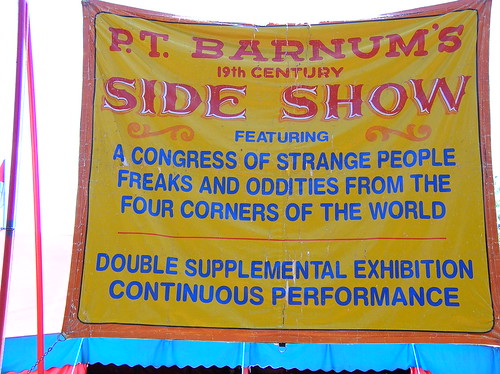
"A Congress of strange people..."
We took Linney to visit the Circus Museum ...
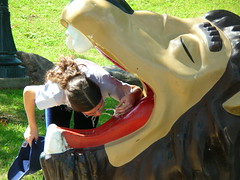
... where we gained many insights into our society. These sinister-looking clown trash cans helped me understand why so many people are scared of clowns.


Getting back to the "side show freak" posters, they had the typical fat lady and Jo-Jo the Dog Faced Boy...
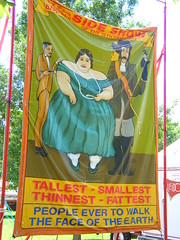

... but what fascinated me was the changing standards for what makes a "strange attraction."
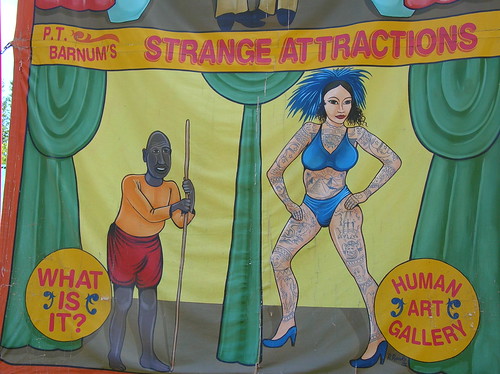
Except for the blue bikini, the woman depicted at right looks just like the barista I buy coffee from several days a week at Grandma Moses.
Saturday, August 20, 2005
Best in Show
Been too long at the fair
Some more images from My State Fair.
1. The Nauseator.

Motion sickness machine in the lurid amusement park section of the Fair. Question: how much time after your kid hurls does he say, "I want a cream puff?" Thank goodness for...
2. The Cream Puff Airlift.

You can board right at the amusement park section for non-stop service directly to the cream puff concession stand. It carries you straight over the livestock exhibitions, which you may want to skip after riding "the Nauseator." But here's what you'd be missing:
3. Question: Do rabbits make good house pets?
Hint:

Answer: The people who know about these things house the rabbits with the chickens. What do you think?
4. If those chickens could talk with those rabbits, what would they be saying?
"Beef -- it's what's for dinner!"
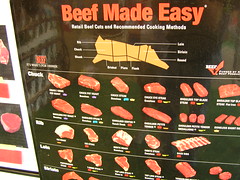
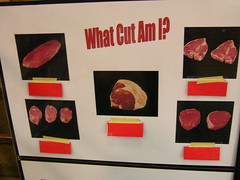
Easy for whom?
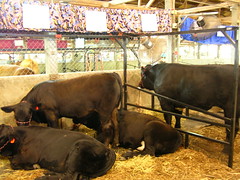
1. The Nauseator.

Motion sickness machine in the lurid amusement park section of the Fair. Question: how much time after your kid hurls does he say, "I want a cream puff?" Thank goodness for...
2. The Cream Puff Airlift.

You can board right at the amusement park section for non-stop service directly to the cream puff concession stand. It carries you straight over the livestock exhibitions, which you may want to skip after riding "the Nauseator." But here's what you'd be missing:
3. Question: Do rabbits make good house pets?
Hint:

Answer: The people who know about these things house the rabbits with the chickens. What do you think?
4. If those chickens could talk with those rabbits, what would they be saying?
"Beef -- it's what's for dinner!"


Easy for whom?

Friday, August 19, 2005
Existential Friday: what is mid-life crisis?
[UPDATE:]
By his 31st birthday, Merriweather Lewis was as accomplished as almost anyone in U.S. history.
He was leading the Lewis and Clark expedition about halfway toward its goal, having traveled by foot and rudimentary boats through well over a thousand miles of backcountry and wilderness, from Pittsburgh to present day Montana. He had already catalogued dozens of plant and animal species unknown to western science, and mapped hundreds of miles of uncharted territory.
His resume included several years of military service rising to the rank of captain, and two years as President Jefferson’s personal secretary and daily companion, during which time he almost single-handedly advised Jefferson in reforming the army. He had the complete skill sets to operate a Virginia plantation (including animal husbandry, food production, business management and surveying) or survive in the wilderness (including hunting and cooking, building and operating a canoe, and rudimentary communication with Indian tribespeople through sign language), and he was proficient at mapmaking, celestial navigation, botany, zoology and practical medicine.
Yet on his 31st birthday, Lewis's journal entry records the gloomy reflection that his life was half over and that he had squandered his time thus far without doing anything much to advance the general welfare of mankind. And he resolved to renew and redouble his efforts to accomplishing something useful.
Yes, Merriweather Lewis, in the middle of leading his historic expedition across the American continent, was also in the midst of a mid-life crisis.
Lewis’s journal confirms for me an enduring truth about our driven American (perhaps western) lives. Mid life crisis is a condition that effects pretty much all of us, and is nothing more or less than a consciousness that our lives are half over: that in a number of years that is probably no more (and possibly much less) than the number of years we have lived, we will be dead.
In Lewis’s time of much shorter life expentancy, 31 was well into middle age. Today, the marker for mid-life and the attendant mid-life crisis is 40. Although I believe mid life crisis is fundamentally a psychological, philosophical and cultural phenomenon – it is biological only secondarily, in the sense that it is an attitude about the biological fact that the body ages and dies – it is as much a part of the process of human development in our culture as is the attainment of “adulthood.”*
I’ll explore the mid life crisis a lot in the pages of Existential Friday. For now, I’ll leave you with two key points about mid life crisis.
1) Mid life crisis is serious business. In our society, the phrase “mid life crisis” has become the punchline of a joke. It calls to mind a foolish and losing battle to cling to the last traces (or lost traces) of youth. Paunchy, bald men driving around in “sexy” cars and lusting hopefully after much-younger women. Wrinkled women in tight leather pants talking too loudly with their friends in a bar.
But those are only symptoms – typical reactions of people to the underlying reality of the mid life crisis. If sports cars and leather pants are foolish, it’s because they may be a sign of a lack of reflection, of trying to distract ourselves from the meaning of mid-life rather than facing it. On a basic level, however, are they any more “foolish” than trying to make all the money you can?
In any event, mid life is a crisis. I don’t mean that it’s a justification for becoming self absorbed and self-dramatizing. But it involves confronting the great, insoluble problem of life: mortality. Death – and being at least halfway toward it – is no joke.
2) Mid life crisis is a sort of wisdom. Can be a sort of wisdom. The consciousness of death that comes around age 40 is a consciousness that is simply unavailable to younger people – even those in their late 30s. We all understand how children are too self-absorbed to have this sort of awareness – that’s just a normal part of human psycho-biological development. But I maintain that teens (despite their occasional flirtations with suicide), 20-somethings (despite their drama) and 30-somethings (despite their immersion in newfound “responsibility”) lack this awareness. Yes, people under 40 at some point come to “know” that they are not immortal and will die one day. But that knowledge is abstract, theoretical, purely intellectual. They don’t know it in their bones.
People under 40 feel – paradoxically, but fundamentally – that they are moving through a series of life-stages, each one of which lasts forever. They don’t get it.
And because they don’t get it, they laugh and joke about “mid life crisis.” And many people over 40 laugh and joke about mid life crisis too – but that itself is just another way of clinging to youth.
And for all of us, joking about mid life crisis is no different from joking and laughing about death – or about any of our fears.
__________
*I don’t find it a contradiction in terms that human development has a huge cultural and psychological component. Our society, for example, declines to recognize the sexual autonomy of people under 18 or so years old based on cultural and psychological factors, even though biological sexual maturity is generally reached by age 14.
By his 31st birthday, Merriweather Lewis was as accomplished as almost anyone in U.S. history.
He was leading the Lewis and Clark expedition about halfway toward its goal, having traveled by foot and rudimentary boats through well over a thousand miles of backcountry and wilderness, from Pittsburgh to present day Montana. He had already catalogued dozens of plant and animal species unknown to western science, and mapped hundreds of miles of uncharted territory.
His resume included several years of military service rising to the rank of captain, and two years as President Jefferson’s personal secretary and daily companion, during which time he almost single-handedly advised Jefferson in reforming the army. He had the complete skill sets to operate a Virginia plantation (including animal husbandry, food production, business management and surveying) or survive in the wilderness (including hunting and cooking, building and operating a canoe, and rudimentary communication with Indian tribespeople through sign language), and he was proficient at mapmaking, celestial navigation, botany, zoology and practical medicine.
Yet on his 31st birthday, Lewis's journal entry records the gloomy reflection that his life was half over and that he had squandered his time thus far without doing anything much to advance the general welfare of mankind. And he resolved to renew and redouble his efforts to accomplishing something useful.
Yes, Merriweather Lewis, in the middle of leading his historic expedition across the American continent, was also in the midst of a mid-life crisis.
Lewis’s journal confirms for me an enduring truth about our driven American (perhaps western) lives. Mid life crisis is a condition that effects pretty much all of us, and is nothing more or less than a consciousness that our lives are half over: that in a number of years that is probably no more (and possibly much less) than the number of years we have lived, we will be dead.
In Lewis’s time of much shorter life expentancy, 31 was well into middle age. Today, the marker for mid-life and the attendant mid-life crisis is 40. Although I believe mid life crisis is fundamentally a psychological, philosophical and cultural phenomenon – it is biological only secondarily, in the sense that it is an attitude about the biological fact that the body ages and dies – it is as much a part of the process of human development in our culture as is the attainment of “adulthood.”*
I’ll explore the mid life crisis a lot in the pages of Existential Friday. For now, I’ll leave you with two key points about mid life crisis.
1) Mid life crisis is serious business. In our society, the phrase “mid life crisis” has become the punchline of a joke. It calls to mind a foolish and losing battle to cling to the last traces (or lost traces) of youth. Paunchy, bald men driving around in “sexy” cars and lusting hopefully after much-younger women. Wrinkled women in tight leather pants talking too loudly with their friends in a bar.
But those are only symptoms – typical reactions of people to the underlying reality of the mid life crisis. If sports cars and leather pants are foolish, it’s because they may be a sign of a lack of reflection, of trying to distract ourselves from the meaning of mid-life rather than facing it. On a basic level, however, are they any more “foolish” than trying to make all the money you can?
In any event, mid life is a crisis. I don’t mean that it’s a justification for becoming self absorbed and self-dramatizing. But it involves confronting the great, insoluble problem of life: mortality. Death – and being at least halfway toward it – is no joke.
2) Mid life crisis is a sort of wisdom. Can be a sort of wisdom. The consciousness of death that comes around age 40 is a consciousness that is simply unavailable to younger people – even those in their late 30s. We all understand how children are too self-absorbed to have this sort of awareness – that’s just a normal part of human psycho-biological development. But I maintain that teens (despite their occasional flirtations with suicide), 20-somethings (despite their drama) and 30-somethings (despite their immersion in newfound “responsibility”) lack this awareness. Yes, people under 40 at some point come to “know” that they are not immortal and will die one day. But that knowledge is abstract, theoretical, purely intellectual. They don’t know it in their bones.
People under 40 feel – paradoxically, but fundamentally – that they are moving through a series of life-stages, each one of which lasts forever. They don’t get it.
And because they don’t get it, they laugh and joke about “mid life crisis.” And many people over 40 laugh and joke about mid life crisis too – but that itself is just another way of clinging to youth.
And for all of us, joking about mid life crisis is no different from joking and laughing about death – or about any of our fears.
__________
*I don’t find it a contradiction in terms that human development has a huge cultural and psychological component. Our society, for example, declines to recognize the sexual autonomy of people under 18 or so years old based on cultural and psychological factors, even though biological sexual maturity is generally reached by age 14.
Thursday, August 18, 2005
"I hope your cream puffs are improperly filled"
This is what my brother-in-law Bill said to an obnoxious driver who cut us off as we were trying to drive out of the parking lot at My State Fair. Can you think of a more fitting State Fair curse?
My State Fair sells literally millions of cream puffs each year during the Fair's 10 days of operation.
And the efficiency with which they move the line of cream puff patrons should be studied by armies and any other institutions that feed masses of people.
The cream puffs really are that good. Imagine a delicately baked, savory Yorkshire Pudding, cut in half horizontally and filled, sandwich-style, with chilled freshly whipped cream that has just a touch of sweetness. The cream is so frothy and cool that it refreshes like the first swig of a glass of cold milk.
Okay, so my state is better at making cream puffs than T-shirts about cream puffs. And spelling.
My State Fair sells literally millions of cream puffs each year during the Fair's 10 days of operation.
"Celebrating 80 years of cream puff tradition"
And the efficiency with which they move the line of cream puff patrons should be studied by armies and any other institutions that feed masses of people.
I got on the end of this line and was served after a wait of five minutes!
The cream puffs really are that good. Imagine a delicately baked, savory Yorkshire Pudding, cut in half horizontally and filled, sandwich-style, with chilled freshly whipped cream that has just a touch of sweetness. The cream is so frothy and cool that it refreshes like the first swig of a glass of cold milk.
Specially trained workers form the cream puff production line.
Those filled ones on the rack will not wait long to find a home.
Okay, so my state is better at making cream puffs than T-shirts about cream puffs. And spelling.
Run away!!!
I thought Monty Python and the Holy Grail was somewhat funny the first time I saw it, but my laughs became increasingly forced with each successive (forced) viewing. You know how you can feel like a human laugh track when you're making an effort to enjoy comedy with your hilarious friends (who may or may not be forcing the laughs themselves)?
Can you name 5 attributes of a cult film? Here goes:

Can you name 5 attributes of a cult film? Here goes:
1) Repeat viewings by obsessive adherents.Now showing at our Northwoods vacation condo? Monty Python and the Holy Grail. The movie that milked gratuitious medieval sword-slayings for all their comic value and then some. Here are some catch phrases to get you going:
2) If the humor (or the art form or whatever the schtick is) doesn't totally grab you, it's unbearable after the first or second viewing.
3) Memorization of script by obsessive adherents.
4) Script seems like a catalogue bag of catch phrases.
5) If obsessive adherents are put in mind of one of the catch phrases, they will mechanically repeat nearly all of the film's catch phrases and much of its dailogue, providing own laugh track with each bit, until they have worked up the appetite to see film again. Then they will insist on renting the film or grabbing it off the shelf (if the copy they own is near at hand).
"Bring out your dead!"I don't think it's just me -- all the tag lines seem to have exclamation marks. It's a great time for me to slip off to "Brew Moon" for some wi fi and coffee. For all my anti-Starbucks rhetoric, I sure am a sucker for Norah Jones in the background and this:
"Help, I'm being oppressed!"
"Flesh wound!"
"This is supposed to be a happy occasion. Let' s not bicker about who killed whom!"
"Bring out the holy hand grenade!"
"Nih!"
"Q: What is your favorite color. A: Blue... no! green!... aaauuggghhh!!!"

Still doing it
Jo(e) explains what the parents do during a camping trip when they sneak away from their teenage kids with a beach blanket.
Wednesday, August 17, 2005
Goodnight, Linney
"I'm not going inside that dead guy"
What my neice Linney said about the Inflatable Slain Giant "funhouse" as we viewed it from the ferris wheel, My State Fair.

**

**
Tuesday, August 16, 2005
A college tradition that sucks
My Home Town is a college town, where mid August marks the end date for most student leases. Students clean (if that is the word) their apartments, move out, and move into other ones. We've all done major move-out cleanings, which often involve taking trash out to the curb. At some point in the history of my town, the college students were taught that it's okay to take trash out to the curb like this:

Not all college kids here seem to be totally unaware of the invention of the heavy duty trash bag. Yet scenes like this are repeated all over My Home Town.

Is there a college course called "Somebody will clean it up"?
To be sure, there is a thriving "trash picking" culture here. People bring usable items out to the curb the evening before garbage pickup, and a lot of stuff gets recycled that way. But the above scenes are obviously not part of that informal recycling culture. Most pizza boxes only get used once.

Trash picking? Maybe the dumbell weights. Maybe. But not the shoe.
At least these people seemed to be trying to make some sort of sculpture.

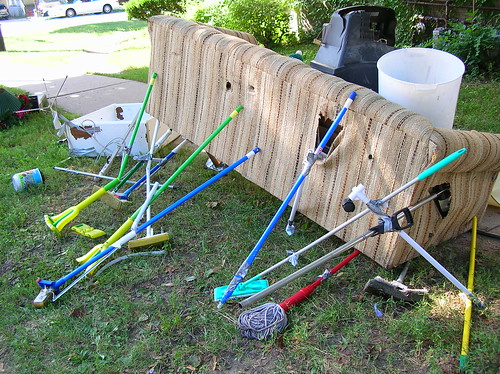
This has to be in violation of local littering laws. I'm toying with the idea of running for county DA here on a platform of sending these kids to jail!
**

Not all college kids here seem to be totally unaware of the invention of the heavy duty trash bag. Yet scenes like this are repeated all over My Home Town.

Is there a college course called "Somebody will clean it up"?
To be sure, there is a thriving "trash picking" culture here. People bring usable items out to the curb the evening before garbage pickup, and a lot of stuff gets recycled that way. But the above scenes are obviously not part of that informal recycling culture. Most pizza boxes only get used once.

Trash picking? Maybe the dumbell weights. Maybe. But not the shoe.
At least these people seemed to be trying to make some sort of sculpture.


This has to be in violation of local littering laws. I'm toying with the idea of running for county DA here on a platform of sending these kids to jail!
**
Monday, August 15, 2005
That blog about the Midway
State fair theme #2: wickedness
I think of My Home State as more on the wholesome side of the Spectrum of Sin and Corruption, By State.
And I think of the State Fair as a wholesome activity.
Why then does the carnival midway at my State Fair seem so ... so ... lurid?


It makes me think of Pleasure Island, the wicked amusement park in Pinocchio where the wicked boys get turned into donkeys and are forced to work the salt mines.
Look what I saw just outside the midway at my State Fair: oh my gosh, its HIM: Lampwick from Pleasure Island!
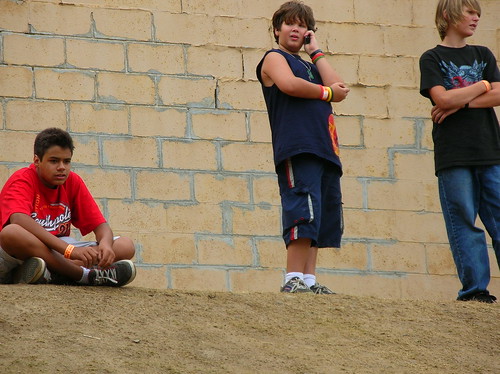
Here's what he's saying on his cell phone: "What, you're telling me you take orders from a grasshopper?"*
Lampwick and his friends make up their own tough-kid ride at the fair:
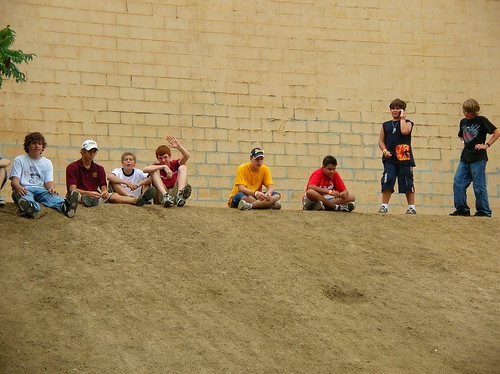

____
*
I think of My Home State as more on the wholesome side of the Spectrum of Sin and Corruption, By State.
And I think of the State Fair as a wholesome activity.
Why then does the carnival midway at my State Fair seem so ... so ... lurid?


It makes me think of Pleasure Island, the wicked amusement park in Pinocchio where the wicked boys get turned into donkeys and are forced to work the salt mines.
Look what I saw just outside the midway at my State Fair: oh my gosh, its HIM: Lampwick from Pleasure Island!

Here's what he's saying on his cell phone: "What, you're telling me you take orders from a grasshopper?"*
Lampwick and his friends make up their own tough-kid ride at the fair:


____
*
Jiminy Cricket: (shouting) Pinocchio! So this is where I find you! How do you ever expect to be a real boy? Look at yourself… smoking, playing pool! Oww! You’re comin’ right home with me, this minute!***
Lampwick: Hey… who’s the beetle?
Jiminy Cricket: Let go! Put me down! (muffled) Let me out!
Pinocchio: He’s not a beetle. He’s my conscience! He tells me what’s right and wrong.
Lampwick: What? You mean you take orders from a grasshopper?
Sunday, August 14, 2005
My State Fair on a stick
I went to My State Fair last Friday. What are the top ten themes that come to mind when you think of state fairs?
Number one has to be "spider saves life of prize pig by writing 'Prize pig' in web above pigpen."
Number two has to be "things that you didn't realize could be put on a stick."

"Frozen cheesecake on a stick."

"Pork chop on a stick."
There's nothing surprising about a corn dog on a stick at a state fair. Except perhaps when the corn dog comes on a weapons grade stick:

This is the state fair food equivalent of a sword cane.
***
Number one has to be "spider saves life of prize pig by writing 'Prize pig' in web above pigpen."
Number two has to be "things that you didn't realize could be put on a stick."

"Frozen cheesecake on a stick."

"Pork chop on a stick."
There's nothing surprising about a corn dog on a stick at a state fair. Except perhaps when the corn dog comes on a weapons grade stick:

This is the state fair food equivalent of a sword cane.
***
Regular or decaf?
A month of Sunday
No, it's not a typo. It's a description of what August feels like to an academic. My friend and colleague, WarrenPK said that August feels like Sunday evening -- the waning moments of free time before you have to go back to work -- because academics spend most of August with a backdrop of anxiety about getting ready for classes, meeting end-of-summer deadlines for overly ambitious summer projects, and regretting time that could have been more productively spent.
I'm not looking for sympathy here -- I realize that we academics are very privileged to have the summer, not off, exactly, but largely free from have-to-be-at-the-office responsibilities. I'm just reporting.
**
I'm not looking for sympathy here -- I realize that we academics are very privileged to have the summer, not off, exactly, but largely free from have-to-be-at-the-office responsibilities. I'm just reporting.
**
Saturday, August 13, 2005
My theory about car-buying economics
A sort of open letter to my blogging buddy Tom Bozzo: car nut and economist
A couple of weeks ago, B and I brought our car into the dealership to have the horn fixed. When I came out of the dealer's office after settling up with the cashier, I saw what looked like some guy hitting on B right there in the car lot. He was leaning (lasciviously it seemed to me) into the car window. He saw me approach and hurried away. And B was writing down his number!
That is so not going to happen.
I have a very definite theory about car buying. Although I'm not economist, it seems to make good common sense, and I plan to adhere to it unless I'm convinced otherwise by an economist who knows more about cars than anyone who does not work in or study the automotive field.
My theory is that if you can afford to buy a new car for cash (without financing it), there's no point in buying a used car. Used cars, while cheaper than new cars, are almost never a better value, and are usually a worse value.
Think about it. Q: How do you get a great deal on a used car? A: When the seller sells the car for a lot less than it's worth. How does that happen? Either (a) when the seller has bad information compared to the buyer about the car's value that causes the seller to undervalue it substantially; or (b) when the seller is in some sort of financial strait that causes him to sell at a desperation price (and the buyer has good information about the car's value). Negotiating basically comes down to who has better information and who is better able to walk away from the deal -- the party with those two characteristics will always get the better end of the deal.
You and I are virtually never going to have better information about the value of a used car than the used car dealer, armed with car selling experience and access to mechanics who can examine that particular car. Yes, you can pay $30 or so and have your trusted mechanic check out the car you're considering, but you're going to get only $30 worth of advice -- which is not going to match up well with the dealer's information.
If you luck out and time your purchase at a time when the dealer has some independent incentive to move the car off the lot, maybe you'll get a deal because your relative walk-away power will overcome your information deficit. But I'm putting the odds of that at much less than 10%. Used car dealers have to earn a profit off of used cars, and that profit has to be built into out-dealing the individuals who sell to and buy from them. Buying a used car from a dealer strikes me as astonishingly commonplace given how it's an inevitably losing proposition for the buyer.
With amateur private car sellers, the issue is one of mutual ignorance. Neither party has really good information about what the car is worth. Of course, you can get generic information about the make and model -- it's blue book value and what it's selling for on average on the used car market -- but there will be huge unknown variables stemming from how the car was handled and maintained by its owner(s).
In contrast, these variables are lessened in the case of new cars. Although there are lemons, of course, new cars are going to be more similar to one another because standardized production will be a much bigger factor than variable owner handling and maintenance.
I think you can get a good deal on a used car by shopping long and hard enough to stumble across the desperate or ill-informed seller, but you can't count on it without investments of time that start to add up to significant costs of their own.
Many people assume that used cars are a "bargain" (in the sense of better value) based on the old canard that "the car loses value as soon as you drive it off the lot." I suppose that there is a steep drop in the resale price of a vehicle once it is "driven off the lot" in the sense that it has morphed from a new into a used car. People assume from this odd fact of life that there is thus a new car premium that is merely aesthetic or otherwise unrelated to the car's utility; and that, by buying a used car, you necessarily get good value, since you avoid this essentially worthless premium.
I think that there really is no new car premium. If cars lose disproportionate "value" when driven off the lot, it may be because this market is likely to have a disproportionate number of lemons, and the potential buyers' fear of buying a lemon pushes down the price. But hardly any cars are sold in this condition, and I believe that prices quickly catch up to value within a couple of months and a couple of thousand miles.
There's also a related depreciation myth. Newer cars depreciate (lose resale price/value) faster than older cars, and again many people mistakenly assume that's because the cars are losing "new car smell" rather than driving utility. I think that's false.
From a consumer standpoint, I believe that the depreciation structure reflects a reality that new car miles are more valuable than used car miles. New cars get better gas mileage, have fewer maintenance issues, and are more likely to have repairs covered by warranty. Used cars may be cheaper at the front end to purchase, but hit you harder with the pay-as-you-drive expenses (gas, maintenance and repairs).* And certain aesthetic values of new cars aren't just about how the car looks -- they may be about comfort or even safety.
Obviously, new-car-buying is fraught with pitfalls of its own. But because of the tendency of new cars to be more standard out of the new car lot, the market price is likely to be better correlated with value than the price of a used car.
In my book, the only reason to buy a used car is because your current financial situation does not allow you to buy a new car for cash. In that case, the rip-off of car financing can in essence raise the purchase price of the new car so that you pay far more than its value.
Having written a long, humorless and pontificatory post, I should add the disclaimer that I may not know what the heck I'm talking about.
____
*Collision insurance is more expensive on newer cars, but I'm not sure that this offsets the higher maintenance costs of older cars. Underinsuring a car for collision damage carries hidden costs that may be more expensive than insurance premiums, because collision damage is likely to affect safety and driveability rather than just aesthetics.
UPDATE: Bozzo answers. I'm no economist, but I know an elegant economics turn of phrase when I see one. His bottom line: "A used car can be a rational purchase choice, though not likely because it constitutes an exceptional bargain over a comparable new car: the low price is, in effect, a risk discount."
**
A couple of weeks ago, B and I brought our car into the dealership to have the horn fixed. When I came out of the dealer's office after settling up with the cashier, I saw what looked like some guy hitting on B right there in the car lot. He was leaning (lasciviously it seemed to me) into the car window. He saw me approach and hurried away. And B was writing down his number!
"What was that about?" I asked.Sure enough, a few feet away was a blue 2003 Cilantro with a for sale sign in the window.
"Oh, I said we might get in touch with that guy about buying his used Cilantro. [Name of actual car model changed to preserve anonymity.] It's right over there."
That is so not going to happen.
I have a very definite theory about car buying. Although I'm not economist, it seems to make good common sense, and I plan to adhere to it unless I'm convinced otherwise by an economist who knows more about cars than anyone who does not work in or study the automotive field.
My theory is that if you can afford to buy a new car for cash (without financing it), there's no point in buying a used car. Used cars, while cheaper than new cars, are almost never a better value, and are usually a worse value.
Think about it. Q: How do you get a great deal on a used car? A: When the seller sells the car for a lot less than it's worth. How does that happen? Either (a) when the seller has bad information compared to the buyer about the car's value that causes the seller to undervalue it substantially; or (b) when the seller is in some sort of financial strait that causes him to sell at a desperation price (and the buyer has good information about the car's value). Negotiating basically comes down to who has better information and who is better able to walk away from the deal -- the party with those two characteristics will always get the better end of the deal.
You and I are virtually never going to have better information about the value of a used car than the used car dealer, armed with car selling experience and access to mechanics who can examine that particular car. Yes, you can pay $30 or so and have your trusted mechanic check out the car you're considering, but you're going to get only $30 worth of advice -- which is not going to match up well with the dealer's information.
If you luck out and time your purchase at a time when the dealer has some independent incentive to move the car off the lot, maybe you'll get a deal because your relative walk-away power will overcome your information deficit. But I'm putting the odds of that at much less than 10%. Used car dealers have to earn a profit off of used cars, and that profit has to be built into out-dealing the individuals who sell to and buy from them. Buying a used car from a dealer strikes me as astonishingly commonplace given how it's an inevitably losing proposition for the buyer.
With amateur private car sellers, the issue is one of mutual ignorance. Neither party has really good information about what the car is worth. Of course, you can get generic information about the make and model -- it's blue book value and what it's selling for on average on the used car market -- but there will be huge unknown variables stemming from how the car was handled and maintained by its owner(s).
In contrast, these variables are lessened in the case of new cars. Although there are lemons, of course, new cars are going to be more similar to one another because standardized production will be a much bigger factor than variable owner handling and maintenance.
I think you can get a good deal on a used car by shopping long and hard enough to stumble across the desperate or ill-informed seller, but you can't count on it without investments of time that start to add up to significant costs of their own.
Many people assume that used cars are a "bargain" (in the sense of better value) based on the old canard that "the car loses value as soon as you drive it off the lot." I suppose that there is a steep drop in the resale price of a vehicle once it is "driven off the lot" in the sense that it has morphed from a new into a used car. People assume from this odd fact of life that there is thus a new car premium that is merely aesthetic or otherwise unrelated to the car's utility; and that, by buying a used car, you necessarily get good value, since you avoid this essentially worthless premium.
I think that there really is no new car premium. If cars lose disproportionate "value" when driven off the lot, it may be because this market is likely to have a disproportionate number of lemons, and the potential buyers' fear of buying a lemon pushes down the price. But hardly any cars are sold in this condition, and I believe that prices quickly catch up to value within a couple of months and a couple of thousand miles.
There's also a related depreciation myth. Newer cars depreciate (lose resale price/value) faster than older cars, and again many people mistakenly assume that's because the cars are losing "new car smell" rather than driving utility. I think that's false.
From a consumer standpoint, I believe that the depreciation structure reflects a reality that new car miles are more valuable than used car miles. New cars get better gas mileage, have fewer maintenance issues, and are more likely to have repairs covered by warranty. Used cars may be cheaper at the front end to purchase, but hit you harder with the pay-as-you-drive expenses (gas, maintenance and repairs).* And certain aesthetic values of new cars aren't just about how the car looks -- they may be about comfort or even safety.
Obviously, new-car-buying is fraught with pitfalls of its own. But because of the tendency of new cars to be more standard out of the new car lot, the market price is likely to be better correlated with value than the price of a used car.
In my book, the only reason to buy a used car is because your current financial situation does not allow you to buy a new car for cash. In that case, the rip-off of car financing can in essence raise the purchase price of the new car so that you pay far more than its value.
Having written a long, humorless and pontificatory post, I should add the disclaimer that I may not know what the heck I'm talking about.
____
*Collision insurance is more expensive on newer cars, but I'm not sure that this offsets the higher maintenance costs of older cars. Underinsuring a car for collision damage carries hidden costs that may be more expensive than insurance premiums, because collision damage is likely to affect safety and driveability rather than just aesthetics.
UPDATE: Bozzo answers. I'm no economist, but I know an elegant economics turn of phrase when I see one. His bottom line: "A used car can be a rational purchase choice, though not likely because it constitutes an exceptional bargain over a comparable new car: the low price is, in effect, a risk discount."
**
Changing the world, one cup at a time
"If you don't like the news," says a famous San Francisco radio political commentator, "go out and make some of your own."
I have felt powerless about many things going on in the world. I have felt that nothing I say or do will change the world around me in any way.
But no more self pity. I received this email from Grandma Moses a couple of days ago (I'm on their email list):
**
I have felt powerless about many things going on in the world. I have felt that nothing I say or do will change the world around me in any way.
But no more self pity. I received this email from Grandma Moses a couple of days ago (I'm on their email list):
We are now serving organic cold-brewed decaf iced coffee.How empowering is that? (For the background, see this post.)
**
Friday, August 12, 2005
Existential Friday: Understanding baby boomers
Last year I wrote a couple of posts about baby boomers. The key point was:
As the baby boomers approach the very end of their lives, they'll find a way to turn dying into a cultural reference point. "Death with dignity" will become a watchword, and there will be an influx of consumer interest in novel and clever will-drafting, and in death-related technology and things like cryogenic preservation of human life.
Well, check out the cover story of last Sunday's New York Times: "Will We Ever Arrive at the Good Death?" It may not fit my point exactly, but close enough. Just you watch.
****
The baby boomers “came of age” in “the sixties” (circa 1964-1974), and established cultural hegemony over the rest of us by successfully making their symbols and reference points the virtual masters of culture since that time.I could have sworn I made an additional point, but I can't find it in my blog archives. I know I thought it at the time, but maybe I omitted it as overly morbid. Here it is:
***
As the baby boomers hit mid life, dominant culture became very concerned with their mid-life issues. Their tanklike family vans gave way to tanklike SUVs -- family vehicles disguised, through clever marketing, as mid-life-crisis sex machines. Middle-aged fitness (we won’t repeat the mistakes of our couch potato parents!) became cool, bringing us “power walking” and “power yoga.” Hollywood became very intent on making sure wrinkled stars like Jack Nicholson and Diane Keaton maintained their grasp on sex-symboldom. As the baby boomers’ parents began reaching the end of their lives, and the boomers started worrying about inheriting their parents money to pay off their kids' college tuition bills, abolition of inheritance tax (the so called “death” tax) became stylishly plausible.
As the baby boomers approach the very end of their lives, they'll find a way to turn dying into a cultural reference point. "Death with dignity" will become a watchword, and there will be an influx of consumer interest in novel and clever will-drafting, and in death-related technology and things like cryogenic preservation of human life.
Well, check out the cover story of last Sunday's New York Times: "Will We Ever Arrive at the Good Death?" It may not fit my point exactly, but close enough. Just you watch.
****
Me and my co-op put in our place
Maybe I'm excessively proud of my neighborhood grocery co-op. It's big and has a warm, incandescent ambience, like a funky version of Whole Foods but with good labor practices. They have mostly organic produce (a far wider selection than Whole Foods), and their shelves are stocked with organic and healthy stuff. Even the junk food is organic and healthy.
All this of course means it's more expensive than regular groceries. That's the down side.
My sister and her husband and their 11-year-old daughter (my neice! duh!) are in town for a visit, and the first night, B and I took them to the co-op. My neice Linney seemed sort of flummoxed in the cookie aisle:
All this of course means it's more expensive than regular groceries. That's the down side.
My sister and her husband and their 11-year-old daughter (my neice! duh!) are in town for a visit, and the first night, B and I took them to the co-op. My neice Linney seemed sort of flummoxed in the cookie aisle:
Linney: Aren't there any Oreos around here?
Oscar: How about these Newman-Os? (Paul Newman's healthier version of Oreos.)
Linney: Yuck.
Oscar: They're basically Oreos.
Linney: (Brightening) Hey, Pepperidge Farm! Finally, something I've heard of!
Thursday, August 11, 2005
Photography school
My digital photography leaves much to be desired, but I did come up with an excellent, low-cost idea for learning about photography. I got my talented photographer friends together for a "photo walk" on which we all snapped away with our digital cameras and then compared our results. Since we snapped many of the same subjects, I could really start to learn something about composition by the comparisons. Look at these pics of Mickey's Tavern:
 by Oscar
by Oscar
 by Blogger Friend #2
by Blogger Friend #2
Notice how all three of us were standing in about the same spot. My photo is very blah -- I'm just recording the fact that Mickey's Tavern is there. Both Friends 1 and 2 saw that the car parked around back had to be an important element of the composition. And the street sign -- to me, it was just in the way. Friends 1 and 2 seemed to understand some "if you can't beat 'em, join 'em" principle: that if an obstruction is an immovable part of the scene, it's better to feature it than pretend it's not there. #2 followed the same principle with the power pole and wires, while #1 framed those out of the photo. I tried (unsuccessfully) to ignore them.
There are maybe five elements that make this photo worth taking: the brickwork of the building; the Queen Anne style turret/doorway; the painted "tavern" sign; the beer sign; and the car. #2 captures all five, #1 captures four (trading away the turret to get rid of the power pole), whereas I really only get the brickwork and the turret, failing really to pick up the other three elements. They're there, but my composition doesn't draw attention to them.
Enough amateur photo criticism. The great fun here is the way that carrying around your digital camera makes you start to look at ordinary things around you in a more intense way. Two days after my photo "seminar,"I tried another photo walk. Here are some results:
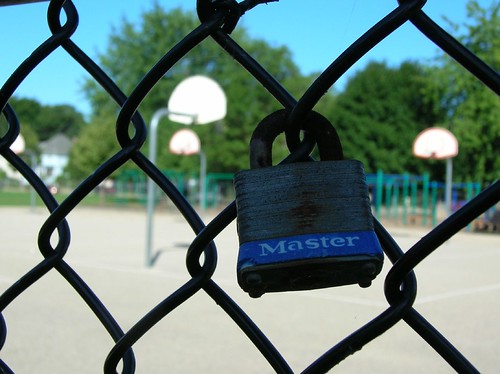
Playground security.

Welcome to the bird cemetary.

Pastel clapboard.

Bus stop.
 by Oscar
by Oscar by Blogger Friend #2
by Blogger Friend #2Notice how all three of us were standing in about the same spot. My photo is very blah -- I'm just recording the fact that Mickey's Tavern is there. Both Friends 1 and 2 saw that the car parked around back had to be an important element of the composition. And the street sign -- to me, it was just in the way. Friends 1 and 2 seemed to understand some "if you can't beat 'em, join 'em" principle: that if an obstruction is an immovable part of the scene, it's better to feature it than pretend it's not there. #2 followed the same principle with the power pole and wires, while #1 framed those out of the photo. I tried (unsuccessfully) to ignore them.
There are maybe five elements that make this photo worth taking: the brickwork of the building; the Queen Anne style turret/doorway; the painted "tavern" sign; the beer sign; and the car. #2 captures all five, #1 captures four (trading away the turret to get rid of the power pole), whereas I really only get the brickwork and the turret, failing really to pick up the other three elements. They're there, but my composition doesn't draw attention to them.
Enough amateur photo criticism. The great fun here is the way that carrying around your digital camera makes you start to look at ordinary things around you in a more intense way. Two days after my photo "seminar,"I tried another photo walk. Here are some results:

Playground security.

Welcome to the bird cemetary.

Pastel clapboard.

Bus stop.
Subscribe to Comments [Atom]

